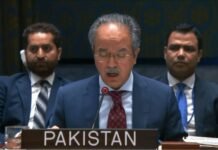New York, 24 November 2021 (TDI): Saudi Representative to the UN, Mohammed Al-Ateeq, delivered a speech on the UN Global Plan of Action to Combat Human Trafficking.
At the beginning of November, UN experts called Saudi Arabia to tackle human trafficking. The organization issued a report regarding human rights abuses perpetrated against migrant women and girls. It also highlighted the need for improvement in the country.
In that sense, Saudi Arabia made a speech in which attaches “great importance to the promotion and protection of human rights”. He also pointed out the role of Islamic Law, saying that these rights are based on regulations and instructions that promote the principles of justice, freedom, and equality.
Human Trafficking and Government Action in Saudi Arabia
Additionally, the Representative highlighted the Kingdom’s advancement in combatting human trafficking. The Saudi system, issued by a royal decree in 2009, is one of the most important regulations to combat these crimes. It has specified the penalties for anyone who commits these crimes but also has clarified the rights of victims. Moreover, it includes the care that should be provided to them during the stages of evidence, investigation, and trial.
According to the official, the system was implemented according to Sharia Law and the international standards to which the Kingdom has become a party. The Cabinet Commission was issued to form a committee to address the issue in the country. In that way, Saudi Arabia ensured its national coordination and integration. The Membership of this Committee includes representatives from government agencies.
Furthermore, Saudi authorities have drawn up a national plan in this regard. The Office of the High Commissioner for Human Rights was also in charge of the creation of the plan.
Al-Ateeq said the issue remains a top priority and concern for the Kingdom. Therefore, the country has doubled its efforts and attention locally and internationally. Moreover, the official welcomed all aspects of joint cooperation between the UN Member States. He considers that shared benefit results from ensuring the dignity and freedom of all human beings.
Arantza Renteria is a Peruvian third-year student of International Relations with a specialization in cooperation and development.
Her work experience mostly covers Middle Eastern affairs. Her area of expertise is the Levant. Among these countries, Lebanon, Iraq, and Palestine.
She has worked in intercultural governmental and non-governmental work environments, including the Embassy of Palestine in Lima.
Currently, she leads the Middle East and Gulf Research Desk at The Diplomatic Insight.







